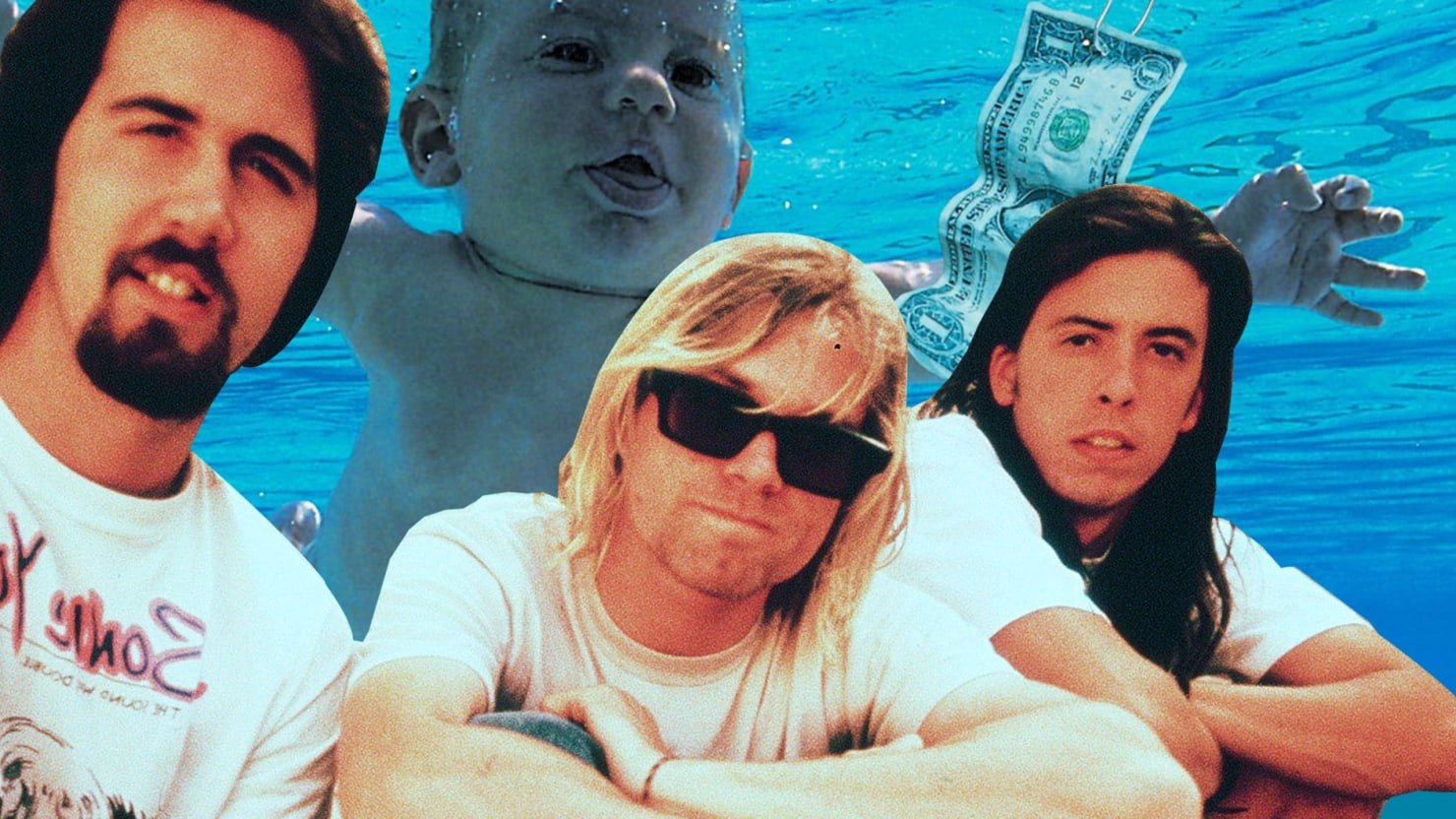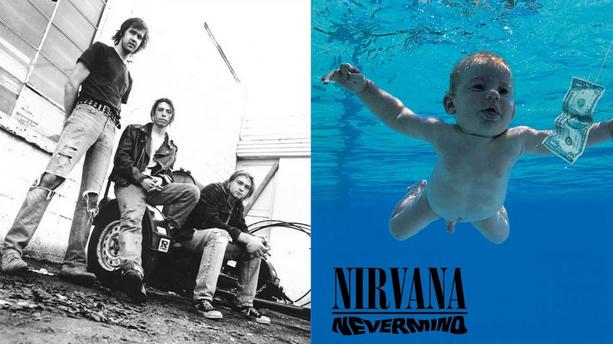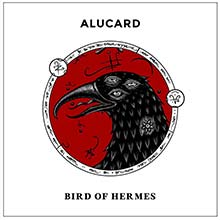
Nevermind at 30: How the Nirvana album shook the world
UK/IT Version – Released 30 years ago, Nevermind was a generation-defining milestone that sold 30 million copies and made a tragic icon of Kurt Cobain.
Ranked the most influential band of all time by US magazine Spin last year, Nirvana’s ethos continues to reverberate in artistes as varied as Billie Eilish, Lana Del Rey and Frank Turner.
Nevermind was back in the news last month when the man who was photographed when he was a baby for the cover sued the band for sexual exploitation.
He was pictured naked, swimming after a dollar bill on a fish hook, in an image that became another iconic aspect of an album whose lead track Smells Like Teen Spirit was ubiquitous across MTV and radio stations around the world.
At the heart of the album’s success were the strange contradictions of Cobain, who was torn between apathy and rebellion, sweetness and rage.
Nevermind united musical tribes that had been largely separate – punk, indie, metal – and added a pop element that made them accessible to everyone else.
“It’s been building up through the years… Nirvana came along and delivered the goods,” said Thurston Moore, of fellow grunge outfit Sonic Youth, at the time.
“It was very pop but very honest and very authentic of the whole American punk rock ethic.”
Cobain was ambitious, his diaries filled with intricate plans, ruthlessly firing drummers until they found the perfect fit in Dave Grohl (now of the Foo Fighters).
But the quadruple-platinum success of Nevermind was a nightmare for his punk-rock ethics.
He was traumatised at the idea that “yuppie scum in BMWs” were listening to Nevermind, and disowned its glossy production.
“I haven’t listened to it since we put it out. I can’t stand that kind of production,” he told biographer Michael Azerrad.
Producer Butch Vig pointed out that Cobain had no problems with it in the studio: “If it had only sold 50,000 copies, he probably wouldn’t have had any comments on whether it was too slick.”
It ended in tragedy.
Cobain’s suicide note was a long screed about the torment of “selling out”.
But it was Cobain’s monomaniacal dedication to the punk cause that gave Nevermind such a ring of authenticity.
From the immediately catchy riffs of Come As You Are and Lithium to the quieter anthems of Polly and Something in the Way, the sound was often furious, but the melodies simple – “like nursery rhymes”, Cobain said.
It was down to the fact that Cobain loved not just underground hardcore bands but also The Beatles, Abba and Queen.
This combined with the raw power of Cobain’s voice which somehow encapsulated both joyous abandon and tortured adolescence.
Crucial to the cult around Cobain was his anti-macho politics.
“If you’re sexist, racist, a homophobe, or basically an a**hole, don’t buy this CD. I don’t care if you like me, I hate you,” he said.
But while Cobain expressed disgust at the apathy of his generation, he also seemed to encapsulate an era marked by the end of the Cold War when political ideologies were dead and it was hard to know where to direct your youthful ennui.
In the end, he chose not activism, but a retreat from stardom, descent into drugs and ultimately suicide.
As the song says – perhaps in mockery, perhaps in exhausted dejection – “Oh well, whatever, nevermind.”
Pubblicato 30 anni fa, Nevermind è stata la pietra miliare che ha venduto 30 milioni di copie e ha reso tragica l’icona di Kurt Cobain.
Classificata la band più influente di tutti i tempi dalla rivista americana Spin lo scorso anno, l’etica dei Nirvana continua a riverberare in artisti come Billie Eilish, Lana Del Rey e Frank Turner.
Nevermind è tornato alla cronaca il mese scorso quando l’uomo che è stato fotografato quando era un bambino per la copertina ha fatto causa alla band per sfruttamento sessuale.
È stato raffigurato nudo, mentre nuotava dietro a una banconota da un dollaro su un amo da pesca, in un’immagine che è diventata un altro aspetto iconico di un album la cui traccia principale Smells Like Teen Spirit era onnipresente su MTV e sulle stazioni radio di tutto il mondo.

Al centro del successo dell’album c’erano le strane contraddizioni di Cobain, combattuto tra apatia e ribellione, dolcezza e rabbia.
Nevermind ha unito tribù musicali che erano state in gran parte separate – punk, indie, metal – e ha aggiunto un elemento pop che le ha rese accessibili a tutti gli altri.
“Si è accumulato nel corso degli anni… i Nirvana sono arrivati e hanno consegnato la merce”, ha detto Thurston Moore, dell’amico gruppo grunge Sonic Youth, all’epoca.
“Era molto pop ma rappresentava la morale punk rock americana”.
Cobain era ambizioso, i suoi diari erano pieni di piani intricati, scartava spietatamente batteristi fino a quando non trova la misura perfetta in Dave Grohl (ora dei Foo Fighters).
Ma il successo del quadruplo platino di Nevermind è stato un incubo per la sua anima punk-rock.
Era traumatizzato all’idea che “feccia yuppie nelle BMW” stesse ascoltando Nevermind e rinnegato la sua produzione patinata.
“Non l’ho ascoltato da quando l’abbiamo pubblicato. Non sopporto quel tipo di produzione”, ha detto al biografo Michael Azerrad.
Il produttore Butch Vig ha sottolineato che Cobain non ha avuto problemi con esso in studio: “Se avesse venduto solo 50.000 copie, probabilmente non avrebbe avuto commenti sul fatto che fosse troppo lucido”.
È finita in tragedia.
La lettera del suicidio di Cobain era un lungo racconto sul tormento del “tutto esaurito”.
Ma è stata la dedizione monomaniacale di Cobain alla causa punk che ha dato a Nevermind un tale anello di autenticità.
Dai riff immediatamente orecchiabili di Come As You Are e Lithium agli inni più tranquilli di Polly e Something in the Way, il suono era spesso furioso, ma le melodie semplici – “come filastrocche”, ha detto Cobain.
Era dovuto al fatto che Cobain amava non solo le band hardcore underground, ma anche i Beatles, gli Abba e i Queen.
Questo combinato con il potere grezzo della voce di Cobain che in qualche modo racchiudeva sia l’abbandono gioioso che l’adolescenza tormentata.
Fondamentale per il culto intorno a Cobain era la sua politica anti-macho.
“Se sei sessista, razzista, omofobo o fondamentalmente uno stronzo, non comprare questo CD. Non mi importa se ti piaccio, ti odio”, ha detto.
Ma mentre Cobain esprimeva disgusto per l’apatia della sua generazione, sembrava anche incapsulare un’era segnata dalla fine della Guerra Fredda, quando le ideologie politiche erano morte ed era difficile sapere dove dirigere la tua noia giovanile.
Alla fine, ha scelto non l’attivismo, ma una ritirata dalla celebrità, la discesa nella droga e infine il suicidio.
Come dice la canzone – forse per scherno, forse per esausto abbattimento – “Oh beh, qualunque cosa, non importa”.


No Comments